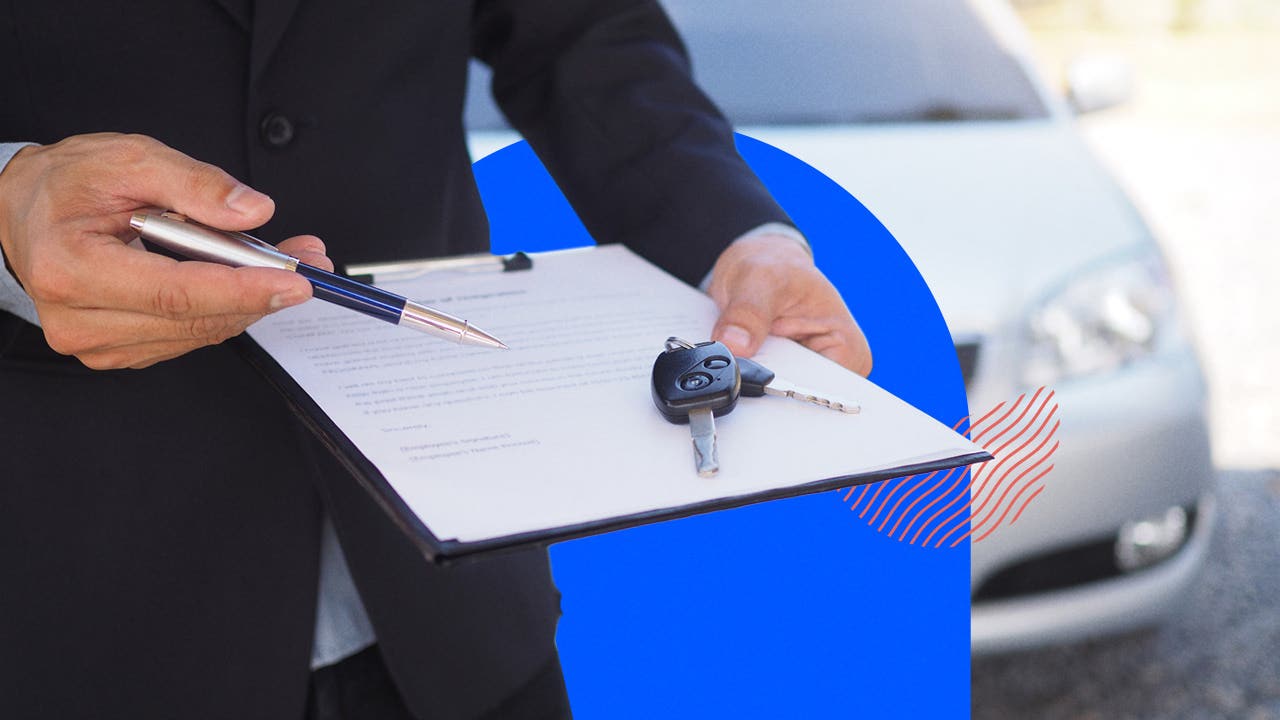Rental car insurance: Do you need it?

If you have ever rented a vehicle, you may have wondered, how does rental car insurance work? Knowing what rental car insurance is, when it can be used and what it covers can help you make the right decision when faced with sales reps eager to sell you a policy at the rental office. The good news is that you may not need to purchase this coverage from the car rental provider in order to be covered. Depending on what insurance you have for your primary vehicle, you may have all the protection you need. Bankrate created this guide to help you understand how car rental insurance works, and when it might be worth the money to purchase coverage.
When do you need rental car insurance?
You may not need additional rental car insurance if you have a personal auto insurance policy with full coverage and are renting a private passenger vehicle. However, your exact rental coverage needs depend on the type of insurance you carry on your personal vehicle, as well as the terms of your rental contract and the reason you’re renting a vehicle.
In some scenarios, your personal car insurance policy may have gaps in coverage that could leave you uninsured or underinsured if you’re in an accident in your rental car. For this reason, most insurance professionals advise discussing your coverage options with your insurance agent before you head to the rental counter.
The scenarios below outline situations in which you may need to purchase rental car insurance before renting a vehicle.
You do not have any type of car insurance
If you don’t have an auto insurance policy of your own, you’ll likely want to purchase insurance from the rental car provider when renting a car. There are a couple of reasons for this. First, most states have strict laws requiring all drivers to carry a minimum amount of auto insurance while driving any vehicle. While that is enough to be street legal, higher liability limits offer better financial protection.
Additionally, the costs of an at-fault accident or other non-collision vehicle damage can add up quickly. Without an insurance policy, you could be responsible for paying any of those costs out of pocket. Consider purchasing additional liability coverage and a damage waiver from the car rental company before getting behind the wheel of a rental vehicle.
In some cases, your travel reward credit card may offer you a collision damage waiver (CDW) or a loss damage waiver (LDW) as a cardholder benefit — and some drivers who have no personal auto policy may rely solely on this insurance option when renting a car.
While rental car coverage through a credit card can be a helpful supplement to a primary insurance policy, it may not offer adequate financial protection on its own. This coverage typically only applies to damage or theft to your rental car. If you are at fault for an accident and only have CDW, you are still on the hook for the cost of liability and property damage caused to the other driver, their passengers and their vehicle.
You do not have collision or comprehensive coverage
Collision and comprehensive coverage are part of what’s known as full coverage car insurance, which covers damage to your vehicle after a collision or other incident, such as hail, theft or fire. These types of coverage typically extend to a rental vehicle. However, if you only have liability insurance coverage, your personal car insurance won’t cover damage to the rental.
To financially protect yourself in this situation, you can purchase a loss damage waiver (LDW) from a rental agency. This agreement waves your financial responsibility for damage or loss of the rental car, including loss from theft.
You do not want to pay a deductible
If you rely on your personal car insurance to protect your rental car, and you get into an accident, you typically have to pay a deductible. However, if you buy rental car insurance and you get into a collision, there typically is no deductible required.
How does car rental insurance work?
Rental car insurance works the same way as regular auto insurance: you pay a certain amount of money in exchange for an insurance company’s agreement to cover losses and claims up to an agreed amount. However, rental car insurance comes in different forms than a standard auto insurance policy.
The most common types of rental car insurance include:
- Collision damage waiver (CDW): For a daily fee on top of your rental fee, a collision damage waiver waives fees associated with damage to the rental car from an accident, fire, vandalism, severe weather and other perils specified in your agreement.
- Loss damage waiver (LDW): Loss damage waivers and collision damage waivers are often used interchangeably, but some rental companies use this term to refer to a damage waiver that covers theft of the rental car on top of other physical damage perils. Be sure to read the details of any waiver offer carefully to understand what is covered.
- Supplemental liability protection: If you don’t have your own liability insurance, this covers bodily injuries or damage you cause to other vehicles or property.
- Personal accident protection: This type of coverage covers medical costs for yourself and your passengers if you’re involved in an accident in your rental car. If you already have personal injury protection or medical payments coverage on an existing auto policy, you may already be covered.
- Personal effects coverage: This optional coverage pays for loss (by theft or damage) to personal belongings in your rental car. If you have a home or renter’s insurance policy, you may already have similar coverage.
Keep in mind that rental car insurance is not the same thing as rental car reimbursement insurance. Rental car reimbursement coverage is a coverage type on many standard auto policies that pays for the cost of a rental car (up to your policy limits) while your vehicle is inoperable due to a covered claim.
How much is rental car insurance?
The cost of rental car insurance depends on a few factors. First, it depends on the company you buy coverage from. It also depends on the state, what type of car you are renting and how many miles you are driving. Purchasing optional add-ons such as personal effects coverage will also increase the amount you pay for rental car insurance on top of your rental car fees.
Is rental car insurance worth it?
In some cases, rental car insurance may be worth it. Review the paperwork carefully to see what the coverage offers. In addition to liability and physical damage insurance, it may also cover loss of use, which pays the rental company if its car is out of commission while being repaired. That coverage may not be part of your own personal insurance or coverage from a credit card.
If you don’t have a personal car insurance policy, or your policy only includes your state’s minimum requirements, you may benefit from rental car insurance. This can offer you more robust coverage that will come into play in far more situations, giving you peace of mind that you’ll be covered no matter what happens.
However, if you have confirmed with your insurance agent that your current personal auto policy will fully extend coverage to your rental vehicle, you may feel comfortable waiving the added coverage. Before declining rental car coverage, contact your agent and request a copy of your insurance ID cards and a binder letter showing what coverage will extend from your car to the rental. This way, you clearly understand the terms of coverage and have an easy way to say no to overzealous rental agents.
Which insurance providers offer rental car insurance?
Most major car insurance providers automatically provide rental car insurance coverage at no additional cost beyond what you are already paying for your monthly premium. However, it is important to remember that the coverage you carry on your policy is what will also apply to your rental. If you have liability-only on your personal auto policy, you may want to consider bridging the gap with an LDW.
Some companies offer standalone rental car coverage policies. The rates for these policies can be cheaper than a standard auto policy, but the coverage provided is not as robust. These rates are also typically lower than those charged by a rental car provider for coverage.
- Allianz Global: Allianz Global’s Rental Car Damage Protector includes $50,000 in coverage for just $11 per day, and offers coverage anywhere in the world. Every policy comes with up to $1,000 in coverage for lost baggage and personal items, 24-hour emergency assistance and $1,000 in trip interruption coverage.
- Bonzah: With a Bonzah rental car insurance policy, you can get up to $35,000 in coverage with a maximum deductible of $500. Bonzah also offers up to $500,000 in supplemental liability coverage.
- RentalCover.com: Rental car insurance from RentalCover.com is meant to supplement insurance from your credit card provider. The company claims that drivers can get supplemental insurance for up to 50 percent less than an LDW waiver from the rental counter. One of the biggest draws is that drivers can cancel their rental insurance for a full refund up until their car pick-up time.
- Sure: Sure is a mobile-based rental car insurance company that is entirely digital. When you download the app, you can select your trip dates, the type of coverage you want, the deductible and more. That means you can update and make changes to your choices on-the-go. Every policy comes with great perks, like flat tire protection, lost key reimbursement and towing coverage.
Frequently asked questions
Why we ask for feedback Your feedback helps us improve our content and services. It takes less than a minute to complete.
Your responses are anonymous and will only be used for improving our website.
You may also like

How much car insurance do I need?

Why is car insurance mandatory?









